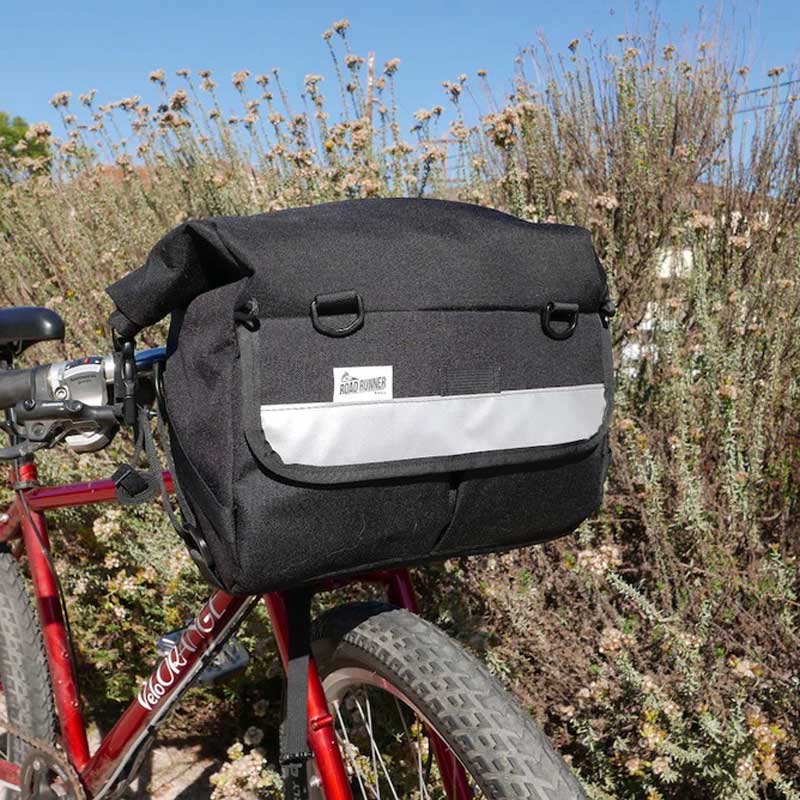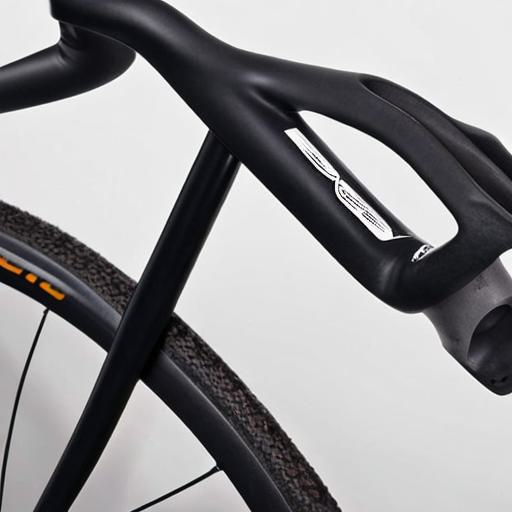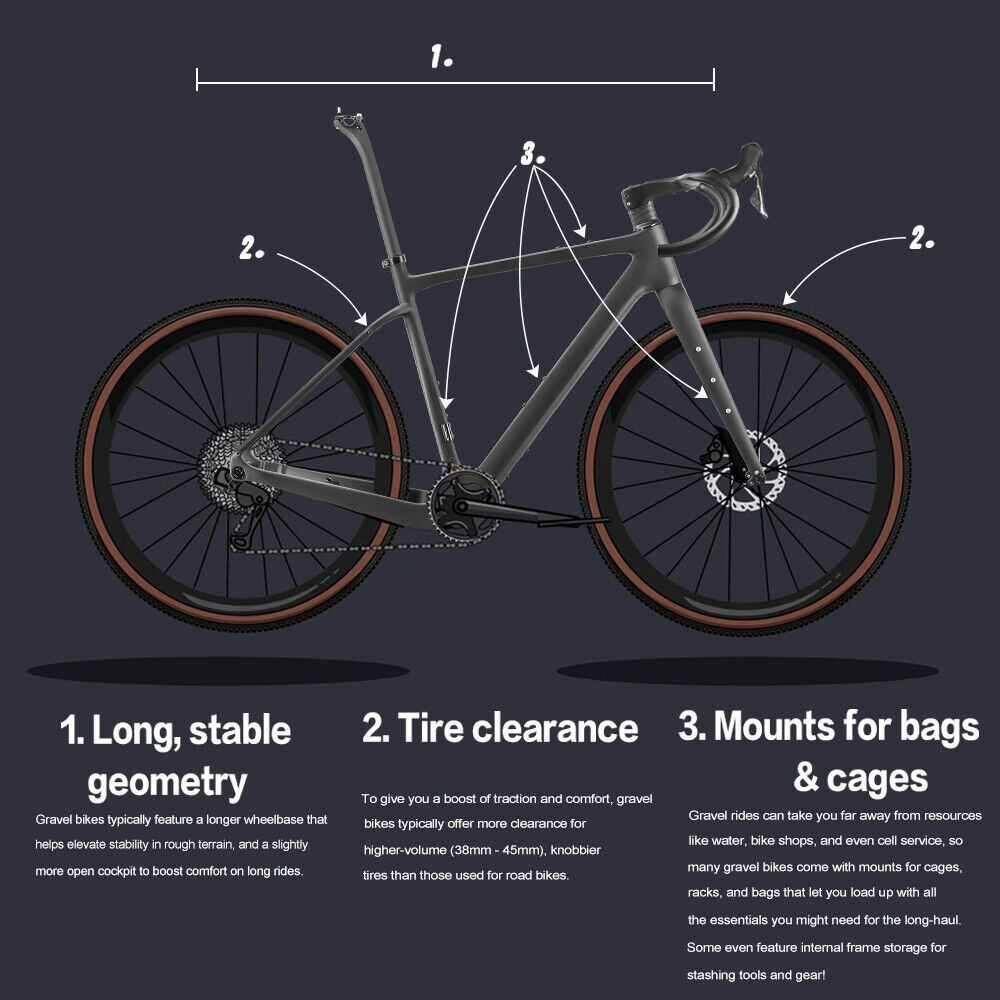Gravel handlebars are designed to enhance comfort and control on rough terrain. These bars offer multiple hand positions to alleviate fatigue.
Gravel biking demands a unique setup to tackle the ever-changing surfaces and demands of off-road terrain. The gravel handlebar emerges as a vital component for any rider aiming to improve their off-road cycling experience. By providing a wider grip and flared drops, gravel handlebars enable better bike handling and stability, catering to the long-distance and varied conditions gravel riders often face.
The ergonomic design reduces the strain on the wrists and shoulders, allowing for a more enjoyable and enduring ride. With the popularity of gravel riding on the rise, choosing the right handlebar has become an important consideration for both casual enthusiasts and seasoned adventurers seeking optimization in off-pavement adventures.

Credit: cyclewyze.com
Introduction To Gravel Riding
Gravel riding unlocks the path to adventure, blending the lines between tarmac and trail. Diverse terrains beckon, as cyclists crave a taste of freedom away from bustling city streets.
Understanding The Appeal Of Gravel Cycling
Biking on gravel roads offers a thrilling mix of exploration and fitness. Cyclists cherish the reduced traffic and serene landscapes. The sport attracts those who seek a challenge and adore nature’s beauty.
- Authentic backroad experience
- Physical and mental test
- Connection with nature
The Evolution Of Gravel Bikes And Equipment
The birth of gravel riding sparked innovation in cycling gear. Early adopters repurposed existing bikes, but soon dedicated gravel bikes emerged with robust frames and versatile gears. Today, gravel handlebars add unmatched control and comfort.
| Year | Milestone |
|---|---|
| Early 2000s | Gravel riding gains traction |
| 2010s | Specialized gravel bikes appear |
| Present | Advancements in gravel handlebars |

Credit: www.facebook.com
Anatomy Of Gravel Handlebars
Anatomy of Gravel Handlebars unlocks a realm of comfort and control. Unique to rough terrains, they are different from standard road or mountain bike handlebars. Gravel handlebars cater to endurance and versatility. Here we dissect the crucial elements that define these rugged companions.
Design And Geometry Of Gravel Handlebars
The design and geometry of gravel handlebars set them apart. A shallower drop and a wider stance provide stability. Flared drops increase control during descents. These features allow riders to navigate varied surfaces with ease.
Material Choices For Durability And Comfort
Gravel handlebars must withstand unpredictable surfaces. Aluminum and carbon fiber are popular due to their balance of strength and weight. Carbon dampens vibrations, enhancing comfort for long rides. Aluminum offers affordability and resilience.
Handlebar Width And Drop: Tailoring To Rider Needs
Finding the ideal fit is crucial. Handlebar width affects handling and comfort. Wider bars offer more control on technical trails. The drop shape dictates reach and wrist position. A correct fit ensures reduced fatigue, leaving you free to enjoy the journey.
| Feature | Benefit |
|---|---|
| Wider Stance | Enhanced stability |
| Flared Drops | Improved control |
| Dampening Material | Comfort on long rides |
Choosing The Right Gravel Handlebar
Welcome to the world of gravel cycling! One crucial decision is the choice of your handlebar. It affects comfort, control, and your overall ride experience. Let’s explore how to pick the one that fits you best.
Assessing Your Riding Style And Terrain
Riding style and terrain shape your handlebar choice:
- Rough trails need wider bars for more control.
- Long rides prefer comfortable shapes to reduce strain.
- The bar should match riding posture for efficiency.
The Importance Of Handlebar Fit And Ergonomics
Fit and ergonomics are key for a great ride:
- Ensure the width aligns with your shoulders.
- Check the reach and drop to sustain a natural position.
- Grip areas should allow varied hand placements.
Comparing Brands And Models: What To Look For
Brands and models differ in quality and design:
- Research user reviews for performance insights.
- Materials impact weight and durability—aluminum or carbon.
- Look at the shape—flared or traditional—to suit your needs.
| Feature | Benefit |
|---|---|
| Width | Better control and stability |
| Drop | Comfort in various riding positions |
| Material | Strength and lightness balance |
Upgrading Your Gravel Handlebar
Are you ready to transform your gravel ride? A handlebar upgrade unleashes new levels of comfort and control. Discover the ideal time for an upgrade, essential installation techniques, and adjustment secrets. Experience a precise fit and impeccable handling on your next adventure.
When To Consider An Upgrade
Boost your bike’s performance and enhance comfort with a new gravel handlebar. Upgrade if you notice:
- Discomfort: Hand or wrist pain during rides.
- Wear and Tear: Visible damage or bending.
- Control Issues: Difficulty in steering or handling.
- Fit: If the current size doesn’t suit your body.
Installation Tips And Tricks
Handlebar installation does not have to be daunting. Follow these steps:
- Choose the right tools: Hex keys, torque wrench, and handlebar tape.
- Remove the old handlebar by loosening the stem clamp bolts.
- Align the new handlebar with the stem, ensuring it’s centered.
- Secure the handlebar by tightening the stem clamp bolts evenly.
- Wrap with fresh tape for grip and cushioning.
Note: Refer to manufacturer guidelines for torque specs.
Fine-tuning Handlebar Position For Optimal Control
Adjust for supreme command over your bike. Perfect the handlebar position:
| Adjustment | Benefit |
|---|---|
| Angle | Reduces strain on wrists. |
| Height | Improves comfort and aerodynamics. |
| Reach | Enhances control and responsiveness. |
Make small adjustments and test ride to ensure perfection.
Must-have Accessories For Gravel Handlebars
Exploring rough and rugged paths demands gear that can handle the challenge. Gravel handlebars are the control center for every adventure ahead. Enhance them with top accessories for the best ride experience.
Grips And Tape For Comfort And Grip
Comfort and control are critical for endurance riding. The right grips or tape can make all the difference. Check out the essentials:
- Ergonomic Grips: Mold to your hand for reduced fatigue.
- Cushioned Tape: Absorbs vibrations, preventing discomfort.
- Textured Surfaces: Ensures a non-slip grip, even in wet conditions.
Mounts And Holders For Navigation And Equipment
Navigate with ease and keep essential gear close. These mounts and holders are a must:
| Accessory | Function |
|---|---|
| GPS Mounts | Secure your navigation device for easy viewing. |
| Phone Holders | Keep your smartphone within reach for apps and communication. |
| Accessory Bars | Extra space for lights, bell, or other tools. |
Lighting And Reflective Gear For Safety
Safety first—regardless of day or night rides. Visibility is key, so gear up with:
- LED Lights: Illuminate your path and stay visible.
- Reflective Tape: Accent your handlebars for increased side visibility.
- Blinking Accessories: Catch the attention of others on the road.
Maintenance And Care
Keeping your gravel handlebar in top condition requires regular maintenance and care. This not only ensures a smooth ride but also extends the life of your equipment. Follow these easy-to-understand tips to keep your adventures worry-free.
Routine Inspection And Cleaning
Consistent checks can prevent long-term issues. Look for signs of wear or damage every time you clean your bike. Follow these simple steps for a routine inspection:
- Examine the handlebar for cracks or bends.
- Check the bar tape for tears or excessive wear.
- Ensure all bolts and clamps are tight and secure.
- Clean with a mild soap solution and dry thoroughly.
Replacing Worn Components
Over time, certain parts of the handlebar may need replacing. Identify these common components that might require attention:
- Bar tape or grips for a comfortable and firm hold.
- Cable housing to ensure smooth gear shifting and braking.
- Cables to prevent unexpected malfunctions.
- Bolts and clamps for structural integrity.
Professional Services Vs. Diy In Handlebar Maintenance
Deciding between professional services and doing it yourself can be tough. Here are the key factors to consider:
| Professional Services | DIY |
|---|---|
| Access to specialized tools | A learning opportunity |
| Expert diagnosis and repair | Cost-effective |
| Time-saving | Personal satisfaction |
Balance your skill level, time, and budget when making your decision. For complex issues, seek a professional mechanic to ensure safety.
Enhancing The Gravel Riding Experience
Gravel riding thrives on versatility and the pure joy of exploring off-the-beaten-path terrain. With the right equipment, riders can enhance their experience, pushing the boundaries of where their bike can take them. The perfect gravel handlebar plays a pivotal role in this adventurous pursuit.
The Role Of Handlebars In Ride Quality
The choice of handlebars can significantly impact the comfort, control, and endurance a rider experiences. Wide bars give more stability on rough trails. Better handling comes from the right bar shape, allowing for multiple grip positions.
- Wide flare angles for control in technical terrains
- Ergonomic shapes ease wrist and arm strain
- Multipositional grips prevent fatigue on long rides
Case Studies: Rider Experiences With Different Handlebars
| Rider | Handlebar Type | Feedback |
|---|---|---|
| Alex | Compact Drop Bar | “More comfort on long climbs, less fatigue.” |
| Sam | Wide Flare Bar | “Excellent control in descents, better bike handling.” |
| Mia | Ergonomic Flat Bar | “No wrist pain, superb for gravel touring.” |
Future Trends In Gravel Handlebar Design
Designers are focusing on developing handlebars that offer a blend of aerodynamics, ergonomics, and lightweight materials.
- Integrated storage solutions for long rides
- Advanced materials for shock absorption
- Customizable width and flare for rider preference

Credit: www.ebay.com
Frequently Asked Questions For Gravel Handlebar
Are Gravel Bars Worth It?
Gravel bars can be a valuable investment for avid cyclists seeking versatility. They enhance control and comfort on mixed-terrain rides, making them an excellent choice for adventure biking and long-distance tours.
How Wide Should Gravel Bike Handlebars Be?
Gravel bike handlebars typically range from 44cm to 50cm. Choose a width matching your shoulder width for comfort and control.
Can You Put Straight Bars On A Gravel Bike?
Yes, you can install straight bars on a gravel bike for a more upright riding position and improved control on varied terrain. Ensure compatibility with existing components for optimal performance.
How Do You Hold Gravel Handlebars?
Grasp the tops for relaxed riding. Grip the hoods for better control and comfort. Hold the drops when descending or sprinting for increased stability and aerodynamics. Adjust your grip based on terrain and fatigue levels for optimal handling on gravel handlebars.
Conclusion
Selecting the right gravel handlebar can redefine your adventure cycling experience. It balances comfort with control on unpredictable terrains. Remember, your riding preferences are key to choosing the perfect fit. Embark on your next journey with confidence, equipped with a handlebar that turns every trail into a joyride.
Happy gravel grinding!

Steven is a professional cyclist and his passion is cycling. He has been cycling for the last 6 years and he loves using bikes while outing as well. Based on his experiences with the different types of bikes; he is sharing his opinions about various bikes so that a beginner can start right away. Find him on Twitter @thecyclistguy Happy Biking.


Leave a Reply